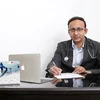
English
Hi, I’m Christine Sides, a coach based in Pennsylvania with over 20 years of experience helping people create change in their lives. My background is in counseling, and over time I saw how many people wanted support that was less about diagnosis and more about building momentum, clarity, and confid…

English
I’m an eating disorder survivor and diet addict turned nutrition expert and health coach. I help women heal their body and soul from the inside out so they can live a life of power, presence, and purpose. I work with women virtually through my signature Foundations Program. Inside the Foundati…

Welcome to the clinic of Dr. Sanchayan Roy, a highly experienced and trusted medical professional recognized as the Best Pulmonologist in Delhi for his patient-focused approach and strong clinical expertise. With years of experience in internal medicine and pulmonary care, Dr. Sanchayan Roy has hel…

Coming Soon

About Sunset Moth Wellness Sunset Moth Wellness provides practical wellness support and solutions through comprehensive health education and care. It serves the general population (both adults and children) and offers burnout recovery and prevention training to helping professionals and students. …

English, Croation
Izabela Marić, certified teacher of yoga and yoga therapy, ITEC alumni, certified Holistic Life Coach, founder of Verbasana yoga studio, president of the Croatian Yoga Association, B.Sc. Indologist. Namaste, my name is Izabela and I encountered yoga more than twenty years ago. I am a certified y…

English
Welcome to Effective Deep Healing / Tranquil Treatments! Clients say: "...permanently changed my life for the better..." "...profoundly relaxing..." "...heal on a deep level..." I offer both "energetic spa" and therapeutic treatments. "Energetic spa" treatments to release your stress an…

English
My name is Megan and I have been in the industry of nutrition, herbal medicine and education for the last ten years. I have my Masters of Medical Science in Human Nutrition and I have worked with a variety of clients. I incorporate herbal medicine in my practice and have a small apothecary in my ho…

English
I have 40 years of energy arts experience, including a Doctorate in Chinese Energetic Medicine and ordination as a Buddhist Lama and Christian Mystical Priest . My experience also includes Tai Chi, Reiki (Levels 1 and 2 certified), yoga and meditation. I have been passionate about teaching an…

English
"To source your health is to reconnect with the origins of your well-being" A Consciousness-Based Collaborative Health Promotion Company At JA WellSources, we believe in making integrative and functional health accessible, equitable, and impactful. As a Holistic Nutritional Resource Specialis…

English
So happy to meet you! My name is Chris Ann Sepkowski. I am a Board Certified Holistic Nutrition and Wellness Coach specializing in Hormonal Health and the proud founder of Be Well with Chris Ann, Inc. 10 years ago, I suffered a major health scare that changed my life. From that experience, I …

English
Coming Soon

Hi there! My name is Michelle Tonkin. I am a Naturopathic Doctor, Certified Nutritional Consultant, Master Herbalist, Master Iridologist and Master Reflexologist. I am a graduate of Trinity College of Natural Health and Acusage Academy. My journey to pursue these degrees started in 2001, as I desir…

Mom of Two, Spiritual Advisor, Author, and Speaker. My services are for the modern spiritual woman looking to get unstuck, attract healthy love, and live in her purpose. I use alternative healing & spiritual interventions. My main focus is on Mindset, Self-Love, Manifestation, Purpose, and C…

Coming Soon

Hello, come on in! I am a holistic relationship coach. I help womxn (women, non-binary, trans) navigate relationship changes. This could include: Status • Single due to bereavement or infidelity • Exploring opening up your relationship • Exploring closing your relationship • A change in…

English
I am a holistic nutritionist that will work with you, beside you, as your advocate and guide you every step of the way towards optimal health and wellbeing. I do not believe in symptom management and instead believe that everything that is going on in your body is related. I also believe that anxi…

English
Welcome to Wellsilience As an Army wife, familiar with juggling the uncertainty of military life, I can tell you that what we put in and on our bodies makes all the difference. Not to mention how we treat those bodies and how we see ourselves through and in relation to them. Join me for tip…

English
Welcome! I am the founder of Tao Holistics, a suite of holistic brands including a holistic medicine virtual clinic, learning Academy, and professional line of botanical medicines. You will only see one service listed here in Sofia, but you can join my clinic site directly at https://app.malla.…
FAQs:
What is a Holistic Doctor?
A holistic doctor treats people using a whole-body approach. That means they focus on your body, mind, spirit and emotions when diagnosing and treating you. Holistic doctors use traditional medicine and also consider factors such as your lifestyle, diet, sleep habits and stress level. Holistic doctors believe there’s a connection between your body systems. They believe optimal health and wellness include a balance of your mind, body and spirit. Holistic medicine doesn’t replace traditional medicine. However, it’s key to the practice of integrative medicine.
What Values Do Holistic Doctors Believe In?
Holistic doctors have various core values they use to practice medicine. Holistic doctors:
- Believe your condition shouldn’t define you.
- Prefer to prevent a disease or condition first, and treat the disease or condition second.
- Believe your condition involves your whole body rather than one body part.
- Search for the underlying cause of your disease instead of just treating your symptoms.
- Believe in using a variety of safe options to treat your condition.
- Trust that the relationship they establish with you can determine a healthy outcome.
What is the Difference Between Naturopathic and Holistic Doctors?
The main difference between naturopathic and holistic doctors is that a naturopathic physician uses natural treatments to allow the body to self-heal, while holistic physicians utilize traditional medicine combined with other systems of medicine and care to provide holistic health.
To become a licensed Doctor of Naturopathy (ND), a naturopathic doctor has to graduate from a four-year, professional-level program at a federally-accredited naturopathic medical school (of which there are currently 7 worldwide). The first two years of medical school for a naturopathic physician are similar to those of conventional medical students, concentrating on biomedical and diagnostic sciences. The following two years cover naturopathic diagnostic and treatment methods and include extensive clinical experience. After earning their degree, a naturopathic physician has to pass the Naturopathic Physicians Licensing Examinations (NPLEX).
Holistic medical physicians are physicians that have finished conventional medical degrees. They are typically a Doctor of Medicine (MD) or Doctor of Osteopathic Medicine (DO). However, they also have a philosophy of holistic health, meaning they believe the body works as interconnected systems and that optimal whole-person health incorporates the balance of not just the body, but the mind and spirit also.
Are Holistic Doctors Real Doctors?
When you’re choosing a holistic doctor, it’s important to choose someone who is trained, licensed, and board certified as a physician. Any doctor with a medical degree can practice holistic medicine, but not everyone who practices holistic medicine is a board-certified physician. This means that some holistic practitioners may call themselves a “doctor” but are not actually licensed to practice medicine.
Is Holistic Medicine Safe?
Yes, holistic medicine is safe under the care and supervision of a board-certified medical doctor. Holistic care focused on prevention and wellness has been shown to help patients manage their health more effectively. Many types of holistic medicine techniques are unlikely to cause harm—however, delaying treatment in an attempt to self-medicate with these methods alone can be dangerous. If you have concerns about your health, it is always best to seek the advice of a healthcare professional.
How Much Does it Cost to See a Holistic Doctor?
The average holistic doctor (who are board-certified in integrative & holistic medicine) will charge between $200 to $300 for an initial visit. This will include typically, a 60-minute comprehensive evaluation of past medical history, interview, physical evaluation, followed by a treatment plan that is right for you. This does not typically include any extra treatments such as x-rays, lab testing, and supplements.
What is Holistic Medicine?
The process of practicing holistic medicine involves treating all aspects of the whole person including body, mind, and spirit. This process has a goal: to achieve optimal health and wellness to prevent illness and disease. This medical and spiritual philosophy deeply believes that people can achieve optimal health through proper balance. In holistic medicine, practitioners believe that if one part of the body isn't working correctly, it can affect the entire body. When a person is out of balance, it has a profoundly negative effect on their overall health and well-being. The incorporation of holistic care involves everything from conventional medicine to alternative therapies as a form of treatment to promote mind and body health positively. It also typically involves the patient making lifestyle changes to achieve optimum wellness to heal from or prevent disease.
Brief History of Holistic Medicine
Holistic medicine is a newer buzzword in the Western medicine world, but it’s not a new concept. In fact, in the 6th century (BC) India, Ayurveda was a form of herbal medicine that focused on healing the energies within the body using the medicinal properties of plants. The herbal treatment used in modern holistic practices originated in Ancient Greece and Rome, gradually making its way to Europe and then to the Americas.
Even Hippocrates, the father of modern medicine, took a holistic approach to treating disease. He encouraged self-healing of the body. The discovery of germs and their role in the cause of disease caused doctors to move away from holistic healing and created a greater focus on treating symptoms and conditions with medication.
Interestingly, in the 1960s, a shift started as people started to move away from modern drugs and medical technology and push for more natural healing methods. In 1975 the National Conference on Holistic Health was held in California, and just three years later the Holistic Medical Association came into being. Today, holistic practitioners have to go through rigorous training similar to that of a medical doctor, but with a focus on herbal therapies, environmental problems, and nutrition in addition to conventional medication.
Principles of Holistic Medicine
Holistic medicine is also based on the belief that unconditional love and support is the most powerful healer and a person is ultimately responsible for their own health and well-being. Other principles of holistic medicine include the following:
- All people have innate healing powers.
- The patient is a person, not a disease.
- Healing takes a team approach involving the patient and doctor, and addresses all aspects of a person's life using a variety of health care practices.
- Treatment involves fixing the cause of the condition, not just alleviating the symptoms.
Why Holistic Medicine is Important
The holistic approach to medicine is a way of healing that prioritizes the well-being of a person. While traditional medicine takes into account only their physical state, holistic medicine cares about much more: the person’s psychological, emotional, and spiritual aspects altogether.
Holistic care has plenty of methods and therapies, containing both conventional and alternative approaches. It recognizes the uniqueness of every individual, highlighting the absence of a standardized treatment approach that fits everyone. Holistic medicine presents a multitude of choices to accommodate the needs and preferences of patients.
Adopting holistic therapy fosters a distinct healing environment, encouraging a meaningful connection between patients and healthcare professionals. The study of holistic medicine plays a beneficial role in the process of recovery.
Different Types Of Holistic Doctors
Some holistic doctors have traditional medical degrees. They pair their conventional medical training with holistic approaches. Other providers may not have a traditional medical degree. However, they have degrees in various forms of complementary or alternative medicine. These doctors include:
1. Integrative Medical Doctor (MD): Integrative medical doctors are fully licensed medical doctors. They combine traditional medicine with whole-body techniques.
2. Doctor of Osteopathic Medicine (DO): Osteopathic doctors are fully licensed medical doctors. They have special training in manually manipulating your musculoskeletal system.
3. Doctor of Chiropractic Medicine (DC): Chiropractors use a hands-on approach to manipulate your joints. They work to reduce your pain and correct your body’s alignment.
4. Doctor of Naturopathic Medicine (ND): Naturopathic doctors use a combination of traditional medical science, holistic approaches and natural therapies.
5. Acupuncturist (LAc): Acupuncturists use the traditional Chinese method of inserting thin steel needles into your skin at certain points. This helps to rebalance your body’s energy, or Qi (pronounced “chee”).
6. Chinese Herbalist: Chinese herbalists use traditional Chinese herbal remedies to treat a wide range of sudden and long-term conditions.
Types of Holistic Treatments
Each holistic practitioner will have his or her own chosen path to wellness, but there are several example treatments common to holistic practices, including:
1. Acupuncture and Acupressure
Acupuncture uses needles to stimulate areas of the body to release energy or activate the nervous system to help ease chronic conditions. Acupressure does the same thing, but instead of needles, it uses a small amount of pressure.
2. Aromatherapy
Aromatherapy uses the sense of smell to help calm the body and soothe some ailments. For example, aromatherapy may use lavender oil patches to improve sleep in patients with insomnia or anxiety.
3. Ayurvedic Medicine
The Ayurvedic practice uses herbs, metals, and dietary changes to address health issues. This practice also focuses on how people and their environments are closely connected.
4. Chiropractic Care
Chiropractic care uses gentle manipulation of the spine and neck to improve the body’s function by improving the function of the nervous system. This can help support the treatment of physical and muscular pain, headaches, or even illness.
5. Naturopathy
Naturopathy uses natural treatments, including herbs and dietary supplements, to support overall health. A naturopathic practitioner may also encourage exercise and dietary changes to help patients feel better.
6. Massage Therapy
Loosening tight muscles and tissues with massage therapy can support overall health and wellness. Many holistic practitioners will use massage in their treatments.
7. Nutrition Counselors
Wellness covers the whole body and that includes proper nutrition. Nutrition counseling helps patients take charge of their health by eating well to support the work holistic practitioners are putting in.
8. Mental Health Counseling
Because holistic medicine takes a mind-body-spirit approach to healing, it often involves mental health therapy. When a person is equipped to manage stress and deal with mental health needs in a healthy manner, they are better equipped to heal.
9. Osteopathy
Osteopathy is similar to chiropractic care but involves more than the spine, it covers the whole body. An osteopath can manipulate the entire musculoskeletal system to help improve the function of the muscles and nerves and support a strong, healthy bone structure.
10. Yoga
Yoga is more than just a form of exercise. It helps with the mind-body connection and creates calmness in the spirit. This supports the holistic view of overall wellness.
Benefits of Holistic Medicine
There are many benefits to holistic medicine, including the following:
1. Overall health improvement: Holistic treatments focus on improving overall health and healing a person’s:
- Physical health
- Emotional and spiritual health
- Social health
- Mental health
2. Natural methods: Holistic doctors mostly use natural medicines, herbs, and noninvasive methods in their treatment plans. Keep in mind, however, that this does not mean these medicines are 100% safe.
3. Personalized care: Holistic practitioners usually provide more consultation time and give more attention to their patients, since they are treating patients as individuals and not just a list of symptoms.
4. Emphasis on prevention: Treatment focuses on preventing diseases before symptoms show up, in addition to regular treatment of illnesses. Because of its focus on finding and eliminating the root cause of the disease, holistic therapies help avoid the need for repeated, expensive treatments.
5. Fewer side effects: Holistic treatment may not have as many side effects as many medications, although this may not always be true depending on a patient’s condition.
6. Empowers patients: Holistic medicine helps patients understand their innate ability to heal. It allows people to take control of their health and wellness through self-care, lifestyle changes, eating healthier, and exercising more.
7. Chemical-free: Patients may be able to reduce the number of pharmaceutical products they are taking or eliminate them from their treatment plan.
8. Easier on finances: Treatments may be less expensive than other treatments.
9. Treats a wide range of conditions: Holistic medicine can be used to treat a wide range of conditions and ailments, including:
-
Insomnia
- Anxiety
- Depression
- Headache
- Back pain
- Chronic pain
- Skin disease
- Heart disease
- Stroke
- High blood pressure
- Fatigue
- Addiction
- Other serious issues, such as lupus and early-stage cancer
While there are many benefits to holistic medicine, keep in mind that it is not necessarily a replacement for traditional medical care. In some cases, certain holistic therapies can interfere with modern medications and do more harm than good. Make sure to talk to your doctor before trying holistic treatments.
How to Find the Best Holistic Doctor Near Me
If you’re interested in finding a holistic doctor, you can ask your friends or family members for recommendations. They know you and what you’re looking for in a doctor. You may want to check for recommendations on social media, but always do your own research. In addition, your current healthcare provider may be able to suggest options for you.
After you’ve compiled a list of options, contact the offices to inquire more about each holistic doctor. Some questions you may want to ask include:
- Is the holistic doctor accepting new patients?
- Does the holistic doctor take my insurance?
- What are the office hours?
- Do you have weekend or evening appointments?
- Do you communicate and collaborate with patients’ existing medical teams?
- What’s your treatment of philosophy?
- Do you practice evidence-based holistic medicine?
Sources:
Premier Health and Holistic Medicine
The content herein is provided for general informational purposes only and is not a substitute for professional medical advice, diagnosis or treatment. Medical information changes constantly, and therefore the content on this website should not be assumed to be current, complete or exhaustive. Always seek the advice of your doctor before starting or changing treatment. If you think you may have a medical emergency, please call your doctor or 9-1-1 (in the United States) immediately.